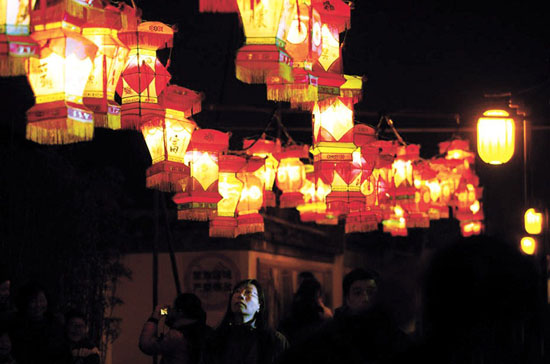 |
|
Ascending Lantern Day
|
This is the time to hoist your glowing lanterns, appreciate them and finally lower them until next lunar new year.
February 12 was Shang Deng or Ascending Lantern Day, February 14 is the famous Lantern Festival (Yuanxiao Jie) that officially concludes the Chinese New Year festivities, and February 17 is Luo Deng or Descending Lantern Day.
Lanterns are traditionally raised on Shang Deng, the 13th day of the first lunar month, and left in place until Luo Deng, the 18th day.
Celebrations throughout the period include dragon and lion dances, stilt walking and, of course, plenty of eating. On Shang Deng, many Chinese eat yuanxiao or glutinous rice dumplings and on Luo Deng they eat mian or noodles.
The round dumplings represent yuan man, meaning everything is perfectly consummated, and the long smooth noodles express wishes for shun chang, meaning everything goes well and smoothly.
In some parts of southern China, hanging up lanterns on the Ascending Lantern Day is both for appreciation and for telling ancestors in the next world the good news about babies born in the past year.
The pronunciation of the word deng or lantern is pronounced much like the word ding (man) in southern dialects. So giving lanterns to newly weds during the celebration is a way of wishing them luck in soon having a son.
Hanging up lanterns on Ascending Lantern Day is a tradition of the Hakka people, telling ancestors of new sons. Families of baby boys prepare at least two lanterns for each boy, one hung at the door of the home and one hung at the ancestral temple. Two small stones are placed in each lantern, signifying a male.
At the beginning of the Ascending Lantern process, worship and offerings to ancestors will be carried out. Families hold a party and banquet after the ceremony, inviting relatives from the clan.
Families with newborn girls traditionally did not hang up lanterns, since there was thought to be nothing to celebrate in patriarchal society. They did not have more ding, meaning productive men who could work, but more kou, meaning mouths to feed until they marry into another family.
Within the family, women could not precede men as they enter the ancestral temple for worship, since that would be a bad sign that more girls than boys would be born in the coming year.
Today in some regions, families with newborn girls also celebrate by raising lanterns on Ascending Lantern Day.
We Recommend:
